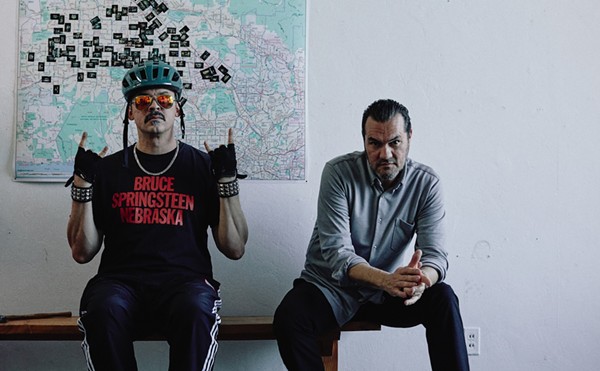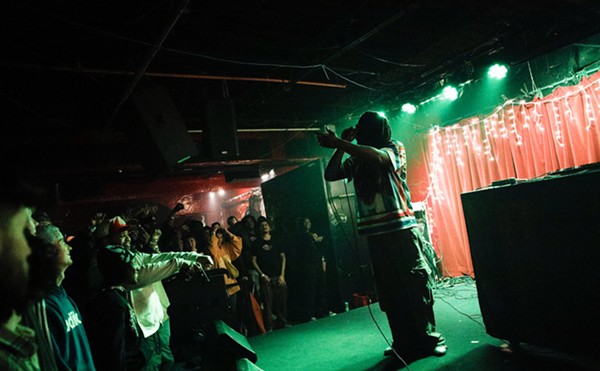In this age of instant information exchange, progression from relative unknown to buzz band can happen fast. Take, for example, the New York duo High Places. It formed after a pen-pal friendship between Mary Pearson and Rob Barber resulted in Pearson's relocation to New York from Kalamazoo, Michigan. Beginning in early 2007, the freshly formed High Places began releasing a series of singles and compilation tracks, resulting in a profile feature on the indie MP3 site eMusic within the year. A contract with venerable Chicago label Thrill Jockey followed, and now Pearson and Barber have released their full-length debut and embarked on their first major tour, all less than two and a half years after their formation. In an e-mail interview, Pearson and Barber discussed the inherent pressure in going from small singles to their first full-length.
"We just eventually had to bite the bullet," says Pearson. "One of our biggest obstacles with writing and recording the full-length was just finding a proper chunk of time when we were home to work on it. We are constant road dogs. So much touring. The length of our songs and releases has always reflected our short attention spans. For me, maybe it's also a bit of a rebellion against my orchestral past; a two minute song instead of a three hour opera. But when it finally came time to work on the album, we were excited and ready to make a more complete, cohesive recording."
The band's eponymous debut is populated by a batch of songs that are much in the vein of its earlier releases (compiled as 3/07-9/07 and released by Thrill Jockey earlier this year). Pearson's playful, poppy vocals float over a bed of percussion (electronic and acoustic), as well as very percussive keyboards and samples. According to the duo, its sound wouldn't be possible without each other.
"High Places is all about yin and yang, and two solo projects coming together to form a new, egalitarian collaboration," explains Pearson. "Everything is a compromise, and therefore we're both always surprised by the end result."
"That is not to say Mary would be making straight-ahead pop without me," continues Barber. "Both our solo projects are pretty oddball. For some reason she utilizes her song-crafting ability more with me, and I do, as well, when I respond to her input."
The duo's nontraditional setup, with no guitar or drum kit onstage, can present challenges in a live setting. Pearson and Barber have incorporated visual presentations within their sets in the past, including a show in New York that featured the work of photographer David Horvitz. Each is working on expanding this element for future shows, but for now they'll be perfecting the sound of the live set.
"I think one of our biggest challenges is making everything super loud and full, but still balanced and clear," says Pearson. "I sing pretty quietly, and it can be hard to combat feedback, with all of our effects and bass. We like to supplement the house sound with our own speaker cabinets so that things are louder onstage and just in front of the stage."
"[I play] a drum pad which utilizes samples," says Barber, explaining his onstage instrumentation. "We make our own samples for our recordings, but live I add to that with these pads. There are also some wooden percussion objects that we mic around the perimeter of the pads for more of an organic feel."
Rare is the artist who does not bristle at categorization, and Pearson and Barber are certainly no exception. When asked about the term "New Primitivism" in relation to their music (you know, the same way you might describe Beat Happening), neither member is particularly fond of the terminology.
"I kinda think we have more in common with Impressionism or collage or something," says Pearson. "We think of what we do as layering and dealing in textures, not as any different reference to 'primitivism.' I don't know. There's something that doesn't seem all that rad about that term, right? It makes me feel like people are calling a culture primitive just because it's not Westernized."
"Like Mary said, it is odd that some extremely complex and inventive music and art, often more so than Western music and art, is called primitive," continues Barber. "But journalists like to be able to define things they see as movements, so it is inevitable and understandable in a way. But it then often turns art into something to react against. 'Ewww - New Primitivist! That is so 2007/2008!'
"However, when one makes sound, it leaves the maker and is then processed and deflected and reflected by the listener. The response can't be controlled anymore by the creator, so whatever association is made is, I guess, appropriate. Maybe applying theÊprimitivist tag to us is applicable because our recording methods and instrumentation are anything but technologically advanced."












